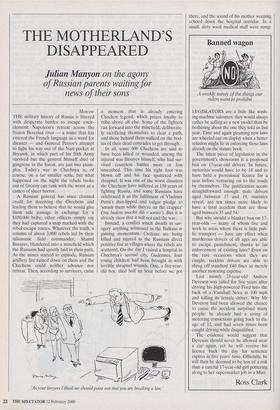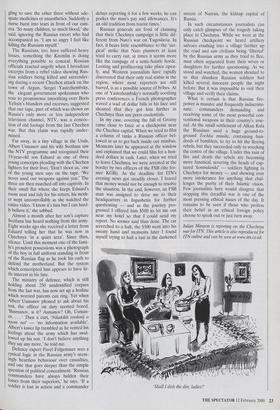THE MOTHERLAND'S DISAPPEARED
Julian Manyon on the agony of Russian parents waiting for news of their sons
Moscow THE military history of Russia is littered with desperate battles to escape encir- clement: Napoleon's retreat across the frozen Berezina river — a name that has entered the French language as a word for disaster — and General Petrov's attempt to fight his way out of the Nazi pocket at Bryansk, in which part of his 50th Army survived but the general himself died of gangrene in the forest, are just two exam- ples. Today's war in Chechnya is, of course, on a far smaller scale, but what happened on the night the rebels broke out of Grozny can rank with the worst as a cameo of sheer horror.
A Russian general has since claimed credit for deceiving the Chechens and leading them to believe that he would give them safe passage in exchange for a $100,000 bribe; other officers simply say they had captured a map marked with the rebel escape routes. Whatever the truth, a column of about 3,000 rebels led by their talismanic field commander, Shamil Basayev, blundered into a minefield which the Russians had quietly laid in their path. As the mines started to explode, Russian artillery fire rained down on them and the Chechens could neither advance nor retreat. Then, according to survivors, came a moment that is already entering Chechen legend, which prizes loyalty to tribe above all else. Some of the fighters ran forward into the minefield, deliberate- ly sacrificing themselves to clear a path, and those behind them walked on the bod- ies of their dead comrades to get through.
In all, some 600 Chechens are said to have been killed or wounded, among the injured was Basayev himself, who had sur- vived countless battles more or less unscathed. This time his right foot was blown off and his face spattered with shrapnel. It was one of the worst disasters the Chechens have suffered in 150 years of fighting Russia, and some Russians have celebrated it as the fulfilment of Vladimir Putin's thin-lipped and vulgar pledge to `smash them while they're on the crapper' (`my budem mochit ikh v sortire'). But it is already clear that it will not end the war.
Instead, a conflict which dwarfs in sav- agery anything witnessed in the Balkans is gaining momentum. Civilians are being killed and injured as the Russians direct punitive fire at villages where the rebels are scattered. On the day I visited a hospital in Chechnya's second city, Gudermes, four young children had been brought in with terrible shrapnel wounds. One, a five-year- old boy, died half an hour before we got As your lawyers I think we should point out that you are breaking a law.' there, and the sound of his mother weeping echoed down the hospital corridor. In a small, dirty ward medical staff were strug- gling to save the other three without ade- quate medicines or anaesthetics. Suddenly a nurse burst into tears in front of our cam- era. `So many children, so much blood,' she said, ignoring the Russian escort who had accompanied us. 'I am so angry I feel like killing the Russians myself.'
The Russians, too, have suffered heavy losses, something the Kremlin is doing everything possible to conceal. Russian officials reacted angrily when I broadcast excerpts from a rebel video showing Rus- sian soldiers being killed and surrender- ing during a recent Chechen attack on the town of Argun. Sergei Yastrzhembsky, the elegant government spokesman who rose to prominence smoothing over Boris Yeltsin's blunders and excesses, suggested that our tape, part of which was shown on Russia's only more or less independent television channel, NTV, was a concoc- tion of old footage from the last Chechen war. But this claim was rapidly under- mined.
Far away, in a tiny village in the Urals, Albert Usmanov and his wife Svetlana saw the NTV programme and recognised their 19-year-old son Eduard as one of three young conscripts pleading with the Chechen fighters for their lives. 'Don't shoot us,' one of the young men says on the tape. 'We never used our weapons against you.' The three are then marched off into captivity. In their small flat where she keeps Eduard's room neat and tidy for his return, his moth- er wept uncontrollably as she watched the entire video. 'I know it's him but I can hard- ly believe it,' she sobbed.
Almost a month after her son's capture Svetlana has heard nothing from the army. Eight weeks ago she received a letter from Eduard telling her that he was now in Chechnya 'in a quiet area'. Since then, silence. Until this moment one of the fami- ly's proudest possessions was a photograph of the boy in full uniform standing in front of the Russian flag as he took his oath to defend the motherland. But the system which conscripted him appears to have lit- tle interest in his fate.
The ministry of defence, which is still holding about 250 unidentified corpses from the last war, has now set up a hotline which worried parents can ring. Yet when Albert Usmanov phoned to ask about his son, the officer on duty seemed bored. `Basmanov, is it? Asmanov? Oh, Usman- ov.... Then a curt, Wikakikh svedenif o nYorn net' — `no information available'. Albert's lower lip trembled as he vented his feelings about the army which has swal- lowed up his son. 'I don't believe anything they say any more,' he told me. Defence expert Pavel Felgenauer sees a cynical logic in the Russian army's seem- ingly heartless behaviour over casualties, and one that goes deeper than the simple question of political concealment. 'Russian commanders have always hidden their losses from their superiors,' he says. 'If a soldier is lost in action and a commander delays reporting it for a few weeks, he can pocket the man's pay and allowances. It's an old tradition from tsarist times.'
Russian generals are fond of claiming that their Chechnya campaign is little dif- ferent from Nato's war on Yugoslavia. In fact, it bears little resemblance to the 'sur- gical' strike that Nato planners at least tried to carry out, at times it seems more like the rampage of a semi-Asiatic horde. Looting and profiteering take place open- ly, and Western journalists have rapidly discovered that their only real status in the region, where most reporters are still barred, is as a possible source of bribes. At one of Yastrzhembsky's normally soothing press conferences a French photographer waved a wad of dollar bills in his face and shouted that they got him further in Chechnya than any press credentials. In my case, covering the fall of Grozny came close to farce at a checkpoint near the Chechen capital. When we tried to film a column of tanks a Russian officer bel- lowed at us to get back inside our minibus. Moments later he appeared at the window and explained that we could film for a hun- dred dollars in cash. Later, when we tried to leave Chechnya, we were arrested at the border by two officers of the FSB (the for- mer KGB). As the deadline for ITN's evening news got steadily closer, I feared that money would not be enough to resolve the situation. In the end, however, an FSB man was assigned to drive me to their headquarters in Ingushetia for further questioning — and as the journey pro- gressed I offered him $500 to let me out near my hotel so that I could send my report. No sooner said than done. The car screeched to a halt, the $500 went into his sweaty hand and moments later I found myself trying to hail a taxi in the darkened streets of Nazran, the kidnap capital of Russia.
In such circumstances journalists can only catch glimpses of the tragedy taking place in Chechnya. While we were at the Russian checkpoint we heard artillery salvoes crashing into a village further up the road and saw civilians being 'filtered' by the Russian army as they tried to flee, men often separated from their wives or daughters for further questioning. As we stood and watched, the women shouted to us that drunken Russian soldiers had killed several innocent people the night before. But it was impossible to visit their village and verify their claims.
What is certain is that Russian fire- power is massive and frequently indiscrimi- nate: commanders demanding and receiving some of the most powerful con- ventional weapons in their country's arse- nal. At the small settlement of Alkan Kala the Russians used a huge ground-to- ground Tochka missile, containing hun- dreds of bomblets, to try to hit the fleeing rebels, but they succeeded only in wrecking the centre of the village. Under this rain of fire and death the rebels are becoming more fanatical, severing the heads of cap- tured `kontraktnild — soldiers fighting in Chechnya for money — and showing ever more intolerance for anything that chal- lenges the purity of their Islamic vision. Few journalists here would disagree that stopping this dreadful war is one of the most pressing ethical issues of the day. It remains to be seen if those who profess their belief in an ethical foreign policy choose to speak out or just turn away.
Julian Manyon is reporting on the Chechnya war for ITV. This article is also reproduced for ITN online and can be seen at www.itn.co.uk `Shall I dish the dirt, ladies?'



































































 Previous page
Previous page